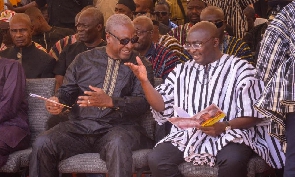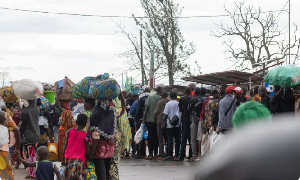Accra, May 4, GNA - A joint stock exchange between Ghana and Nigeria is to be established to strengthen the financial market base in the two countries.
Mr Yeboa Amoa, Managing Director of the Ghana Stock Exchange (GSE), said the initiative, if successful, would be extended to the Economic Community of West African States (ECOWAS) and, in the long run, the whole of Africa.
Mr Amoa said this at a day's roundtable discussion in Accra on Thursday on the topic: "Implications of the Operations of the Ghana Stock Exchange on Private Sector Development in Ghana."
It was jointly organised by the Institute of Economic Affairs (IEA) and the Friedrich Naumann Foundation and was aimed at examining the role of the GSE in mobilising and allocating private capital resources for investments.
Mr Amoa said such a move would enable member countries to join the world global village and bring about regional co-operation, integration and harmonisation of their economies.
He said the Exchange has persistently called for an appropriate and up-to-date legal framework, policies and the right economic environment that would create confidence in both local and foreign investors.
"All efforts have proved futile and the current economic situation is not making things any better. "In the United States, for example, there are speculations on the profitability of investing in Ghana as a country and Ashanti Goldfields Company (AGC), listed on the New York Stock Exchange."
Mr Amoa said this has made a negative impact on the performance of AGC shares on the world capital market and called on all stakeholders to play their part to stabilise, especially, the slide of the cedi. He explained that investors, who are invited into the country, get scared of the dollar-cedi rate, the high inflation figure and interest rates.
Mr Amoa said government did not honour its promise to list state-owned firms being divested on the bourse while efforts to get the private firms to list have also proved unsuccessful.
Foreign consultants were engaged to analyse the situation to come out with strategies of getting private firms to list but "they are either waiting for the aftermath of election to cool down, waiting for inflation figure to decline or waiting for the cedi to stabilise."
"There is never a favourable condition that will convince them to list on the bourse," Mr Amoa said, adding that officials of the GSE would nevertheless, do all they could to encourage private companies to get listed.
Mr Amoa called for the introduction of new financial products such as government, corporate and municipal bonds to make the market more vibrant. There is also the need for the development of human resources that would be extended to the media, the legal system, school authorities and bank officials, who, he said, tend to be rivals instead of allies in preventing customers from investing in certain banks listed on the GSE.
"Some of them went to the extent of preventing people from investing in the Produce Buying Company. They will not play the ball until it comes to their turn." Mr Kwasi Abeasi, Director-General of the Private Enterprise Foundation, said education in stocks begin at the secondary school level in some African countries, including South Africa.
As a result, most students are conversant with the importance of investing on the stock exchange and their benefits. He noted that the situation is different in Ghana and reiterated the call on the educational authorities to include the subject in the school curricula at an early stage and not at the tertiary level only.
A representative of the Ministry of Finance in a contribution said government has not neglected the GSE but would continue to invest in its activities.
Business News of Thursday, 4 May 2000
Source: GNA












